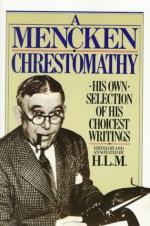
|
| Name: _________________________ | Period: ___________________ |
This test consists of 15 multiple choice questions and 5 short answer questions.
Multiple Choice Questions
1. Mencken has what criticism for "new poets"?
(a) They are too clever for their own good.
(b) They are too musical.
(c) They are too romantic and instinctive.
(d) They are too cerebral and scientific.
2. What does Mencken believe is the proper focus of psychology?
(a) The study of mob mentality.
(b) The study of physical deformity (such as injury) on the mind.
(c) The origins of lying.
(d) The study of psychological differences between people from various trades or types.
3. Who was the attorney on the side of the prosecution in the Scopes Monkey Trial?
(a) Clarence Darrow.
(b) William Jennings Bryan.
(c) Theodore Veblen.
(d) Andrew Still.
4. Who does Mencken consider the greatest classical composer?
(a) Schubert.
(b) Beethoven.
(c) Mozart.
(d) Brahms.
5. Who does Mencken identify as the father of chiropractic?
(a) William Carlos Williams.
(b) John Ayres.
(c) Charles Joseph Bonaparte.
(d) Andrew Still.
6. Mencken begins Chapter 25 with a philosophical discussion of what phenomenon?
(a) Worry.
(b) Genius.
(c) Inspiration.
(d) Indecision.
7. What is Mencken's view of contemporary psychological science?
(a) The field is in chaos, with widely conflicting views.
(b) The field is poorly funded, and suffers because of it.
(c) The field is surprisingly neat and orderly, with little disagreement between schools..
(d) The field is complete quackery.
8. What does Mencken believe about physical punishment in education?
(a) He believes physical punishment should have a regular place in the schedule of a school day.
(b) He believes there is no place for physical punishment in school.
(c) He believes only parents should be called upon to physically discipline their children.
(d) He believes physical punishment should be an option given to teachers.
9. What was Roosevelt's team of political advisers popularly called?
(a) Roosevelt's Riveters.
(b) The Washington Eggheads.
(c) The Brain Trust.
(d) The Brooklyn Thirteen.
10. In Chapter 23, Mencken attends a church service during the Scopes Monkey Trial. What is his impression of that service?
(a) He is shocked by its barbarism.
(b) He is pleased by its sense of decorum.
(c) He is impressed with the sermon of the preacher.
(d) He is outraged that they did not invite William Jennings Bryan.
11. Which is NOT one of the negative effects Mencken mentions in regards to Prohibition?
(a) Undermining of state revenues.
(b) Only the poor have access to alcohol.
(c) Proliferation of bootleggers.
(d) More expensive alcohol.
12. Who wrote Parsifal?
(a) Beethoven.
(b) Wagner.
(c) Schubert.
(d) Strauss.
13. What quality makes for the best literary critic, according to Chapter 24?
(a) Adhering to a specific philosophical system.
(b) The goal to create a work of art.
(c) Advancing a personal agenda or doctrine.
(d) Accuracy and a need to refute error.
14. What does Mencken believe about Freudianism?
(a) It makes several valid points.
(b) It is complete quackery.
(c) It goes further to explain the human mind than anything before it.
(d) It it in no way truly reflects the brilliance of Sigmund Freud.
15. What BEST characterizes Mencken's view of the townspeople involved in the Scopes Monkey Trial?
(a) Secularists.
(b) Simple but endearing.
(c) Backwoods hicks.
(d) Intelligent and probing.
Short Answer Questions
1. What is the second-worst job in the world, according to Chapter 17?
2. Why does Mencken believe life on other planets is highly unlikely?
3. What American book does Mencken call one of history's great masterpieces?
4. In the boxing match Mencken reports on in Chapter 23, why do most want the favorite boxer to lose?
5. What word might Mencken use to characterize Mary Baker G. Eddy?
|
This section contains 603 words (approx. 3 pages at 300 words per page) |

|




